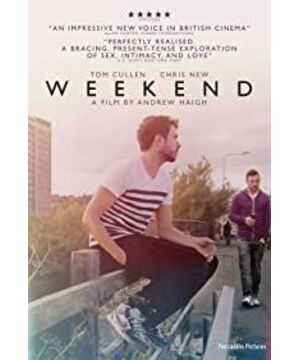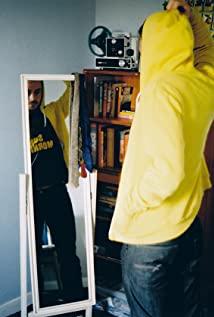The two-day journey of Russell (Tom Cullen) and Glen (Chris New) begins with Glen's predatory ogle in a nightclub, cueing a game of desire. Tries, faults and discrepancies soon surface the next morning after the tides of passion retreat from sobriety . With Cullen and New's crisp performances, Director Andrew Haigh highlighted a remarkable scene where Glen the artist wants to record Russell's account of the night before in their first real conversation, to Russell's great embarrassment. Watching Russell and Glen gives us the impression of two gears yet interlocked, their jagged edges bluntly bumping against each other. Defense, surprise, discomfort and faint liking move them closer and further as they cautiously make their way past the bedroom door.
Yet “Weekend” transcends your typical “morning-after” scenario. Rather than shunning away and rushing to categorize – unfortunately more popular both on screen and in reality – it confronts the arising subtleties and complications by tracking “the rest of the story.” Is it a story of conflict? Is it a tale of romance? Both, and neither. Anchored by meticulous plot layering, the film explores something more than the repeatedly visited concepts such as the social stigma of gay life and gay rights activism. In a way similar to “Brokeback Mountain,” “Weekend” bears a weight of common humanity, a choice that accords dignity to the script. For it is all too easy to fall asunder with this ambition – think the final half hour of “The Tree of Life” – but “Weekend” is able to hold itself together by tackling the small and mundane:the two men meet again and continue their relationship in a weekend of soul-baring conversations, humming anxiety, confessions, awkwardness, confrontations and self-revelation. Nothing hits an entirely new register, yet the achingly familiar dilemmas careful easily resonate with the audience. Should we compromise in order not to hurt others? How far should we follow a pursuit when the future is a blur? The film does not try to provide an answer. If anything, Russell and Glen end their weekend with more uncertainties in their heart than before. Yet in living with questions, they become more genuine and alive.yet the achingly familiar dilemmas easily resonate with the audience. Should we compromise in order not to hurt others? How far should we follow a pursuit when the future is a blur? The film does not try to provide an answer. If anything, Russell and Glen end their weekend with more uncertainties in their heart than before. Yet in living with questions, they become more genuine and alive.yet the achingly familiar dilemmas easily resonate with the audience. Should we compromise in order not to hurt others? How far should we follow a pursuit when the future is a blur? The film does not try to provide an answer. If anything, Russell and Glen end their weekend with more uncertainties in their heart than before. Yet in living with questions, they become more genuine and alive.
At first glance, Russell and Glen represent two ends of a spectrum. We have the self-conscious and reserved Russell, who walks on the fringes of both worlds: that of a single gay adult and that of a reluctant member in the heteronormative society. A lukewarm godfather and distanced colleague, he finds his voices muffled and his existence secondary. He is “fine,” yet not really happy; he is out, but only truly comfortable with his kind in privacy and nightlife. Then we have the unapologetically candid Glen, who belongs to a community riddled with sex, alcohol and parties, from which he grows a cynical and headstrong mind. His buoyant attitude and astringent disregard for conventions, “idiots of love” and “the system” belie a bruised past and failed relationship. These dispositional differences weave in Russell and Glen's interactions,yet like two floating icebergs crashing and pressing into each other, their angles soften and their protecting covers melt. Beneath the veneer of composure, quirk and simmer, they realize their shared tender core and the common longing to seek haven in another soul.
The most outstanding forte of “Weekend” lies in its rawness: not unbridled – in fact quite the contrary – but bare. As a result, such rawness amplifies the senses that mark the encounter, like echoes in an empty space. No warm color- toning or atmospheric music decorates the film. In fact, the soundtrack is nearly exclusively played within Russell and Glen's world, from the nightclub or their neighbors' stereo. In line with immediacy and frugality, the cinematography squarely stays on eye-level, indulging in the shift of bystander and first-person perspectives to create some hard-hitting moments. For example, we watch Glen's first three departures from Russell's point of view in the apartment: without attachment the first time, then lingering and stopping the second time,and finally turning around halfway with his body almost curling to contain himself. Then in the final farewell, the camera shoots from afar. We peep the silent eruption of emotions, blunt as Russell's gaze that breaks through the fourth wall. Simplicity gives that moment a power close to scalding.
How much can a weekend give us? This is no “Titanic,” no romantic fantasy, no fairytales of forevers and promises. In fact, the only mentioning of “love” was squeezed in Russell and Glen's argument on gay marriage. “Weekend” elegantly conveys an empirical attitude: it captures a chance encounter between two men and chronicles how that encounter morphs their experience and views. Hardly melodramatic and containing no breakdown, despair, or psychedelic visuals, it chooses instead to imbue us the bittersweet loneliness, regardless of gender and sexuality, and the solace and passion a fleeting affair can kindle in a cold and hollow urban residence: with reflections and embraces, life brightens again.
View more about Weekend reviews









